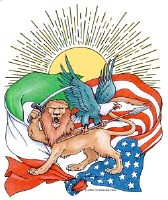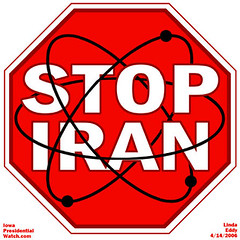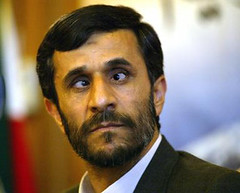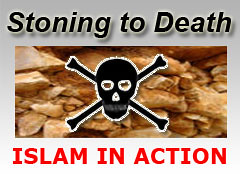by Farangis Najibullah (& comments by Alan)

A former shopkeeper, Shahram Jazaeri claims to have made at least $180 million
Some Iranians are fond of comparing Shahram Jazaeri to Russia's fallen oil oligarch, Mikhail Khodorkovsky.
After all, both amassed their fortunes at early ages and both were eventually convicted of defrauding the government.
Unlike the former Yukos oligarch, however, Jazaeri is not known to have harbored political ambitions. Also unlike Khodorkovsky, whose case serves as a reminder of the cost of running afoul of the Kremlin in the Putin era, Jazaeri has twice been the beneficiary of courts interceding on his behalf.
Last week, an Iranian court reduced Jazaeri's already-shortened 14-year prison term to 11 years.
The 36-year-old Iranian is serving a prison term for his involvement in a high-profile corruption case involving politicians and the family members of many famous Iranian clerics, including the supreme leader's brother.
But Jazaeri's ability to run his multimillion-dollar business activities from prison and two reductions in his sentence for white-collar wrongdoing raise questions about the authorities' seriousness in dealing with corruption.
President Mahmud Ahmadinejad and his allies have made corruption a frequent theme of their attacks against entrenched political rivals and a convenient whipping boy during the president's whistle-stop tours to drum up support for his policies.
But the leniency now being afforded to Jazaeri could prompt public skepticism of the authorities' willingness to tackle corruption, particularly since it appears that no officials have ever been prosecuted in the case.
Jazaeri reportedly confessed during his 2001 trial to paying hundreds of thousands of dollars to Hadi Khamenei -- the brother of Iranian Supreme Leader Ayatollah Ali Khamenei, who holds ultimate political and religious power under Iran's Islamic constitution -- as well as to former parliament speaker Mehdi Kahrubi.
Kahrubi has denied any suggestion of bribery and described the claim as a politically motivated attack on the legislature, the Majlis.
The scandal has mostly been linked to reformist politicians, but allegations of cash for favors in Jazaeri's case have extended to both reformists and conservatives alike.
Jazaeri was arrested in 2001 and charged with a long list of crimes including bribery, forging official documents, and massive embezzlement of state money and assets.
Key details of Jazaeri's alleged illegal activities were not disclosed during his trial, sparking speculation that officials were trying to cover up their own involvement in the case.
Qassem Sholeh-Saadi, an Iranian lawyer and former legislator, tells RFE/RL's Radio Farda that although Jazaeri was found guilty of bribing some officials, not a single official has been tried or punished in any way for taking the bribes.
"Only Mr. Shahram Jazaeri has been prosecuted and convicted," Sholeh-Saadi says. "I have never heard of any of those people who received this illegal money -- or bribe -- have been prosecuted or convicted."
Jazaeri emerged from modest beginnings and worked as a shopkeeper in the western city of Ahvaz until his mid-20s.
By the time he was arrested in 2001, at the age of 29, Jazaeri had made some $180 million by his own account.
Many of his business activities are unknown, but he has founded several successful enterprises and worked as a broker in the oil business.
His 2002 trial reportedly involved 50 defendants -- many of them the sons of prominent clerics.
Jazaeri was convicted and initially sentenced to 27 years in prison. In 2004, his sentence was partially overturned and reduced to 14 years.
In February 2007, Iran's Special Judicial Complex for Economic Affairs announced that Jazaeri had escaped while being transferred for a hearing before an expert financial committee.
Reports have suggested that Jazaeri had previously been allowed leaves from prison, a privilege unavailable to most inmates.
Iranian media suggested that some clerics were involved in aiding that escape. Iran's judiciary fired several officials who were involved in his case, including the head of Tehran's vaunted Evin Prison and a number of judges.
Soon afterward, Iranian security services confirmed that Jazaeri had been arrested in an Arab country, with some reports saying he had been hiding in a remote village in Oman.
Many Iranian prisoners suffer desperate conditions with little access to the outside world. But Jazaeri reportedly has access to a laptop computer and mobile phone while in jail, where he continues to manage his business interests.
Alan note: here's some background on Iran's Supreme Leader, Ali Khamenei whose brother was accused above of receiving money from Jazayeri.
Prior to the Khomeini revolution "ayatollah" Khamenei lived in a single room dwelling in one of the poorest parts of the North Eastern "holy" city of Mashhad and subsisted on food packages from the Imam Reza Shrine (Moslem Saint of Miracles) as charity.
He eked out a bare subsistence by tagging uninvited, among others, onto burials at cemeteries and begging for alms while spouting prayers for the dead person he did not know.
Greater poverty than of this pauper is hard to imagine and irked him.
He is on record of having been asked that if ever he became the Shah what would be his greatest priority?
He replied "to ensure all Iranians were financially comfortable and not facing his lack of money.
This same pauper recently reportedly moved nearly TWO BILLION DOLLARS to Islamic banks in Brunei, Malaysia, Indonesia and Singapore to avoid the funds being seized or frozen by UN sanctions and Wesern banks.
Meanwhile, he is now in supreme charge of a populace that cannot afford basic food costs, let alone pay rent and utilities or pursue happiness.
It appears he has turned almost everyone, except the corrupt Mullah predators and their henchmen, paramilitary forces, including law enforcement agents, into the paupers he used to be,
Without any twinge of conscience or memory of how hard life can be and used to be for him until he amassed an unjustifiable fortune.
The hypcrisy of the Mullahs shows clearly in these two Kayhan (Iran) Headlines around the time of the revolution.
 The top one instructs nobody to buy a house adding we will make you a homeowner (give you a free one).
The top one instructs nobody to buy a house adding we will make you a homeowner (give you a free one).The lower graphic quotes Khomeini daying, "Clerics must never become 'President' of the Republic". Meaning, never take charge of the country's administration and governance.














No comments:
Post a Comment